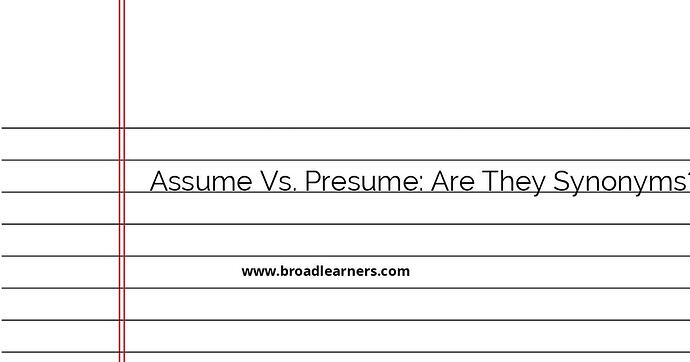The words "assume" and "presume" are often used interchangeably, leading to confusion. However, despite their similarities, they are not true synonyms and have distinct meanings and implications in English usage. Let us explore these differences in detail to ensure clarity in communication:
Understanding "Assume"
To assume something means to take it for granted or suppose it to be true without proof. It often involves making an estimation or belief based on incomplete information or evidence. The verb "assume" suggests a degree of uncertainty and conjecture.
Example:
"I assume that the meeting is canceled because I haven't received any notification."
Here, the speaker believes the meeting is canceled based solely on the absence of a notification rather than confirmed information.
Key Characteristics of "Assume":
- Implies a decision or belief made with incomplete or limited evidence.
- Often involves guessing or estimation.
- Used when one is uncertain or lacks full information.
Understanding "Presume"
To presume means to accept something as true based on probability or reasonable evidence. It implies a stronger likelihood or assumption backed by some degree of evidence or logical reasoning. The use of "presume" connotes more confidence and consideration than "assume."
Example:
"Since he has worked here for ten years, I presume he has a good understanding of the company's procedures."
In this context, there is a logical basis for the belief about the person's knowledge due to their extensive experience with the company.
Key Characteristics of "Presume":
- Implies a belief or decision with probabilistic reasoning or evidence.
- Suggests more certainty compared to "assume."
- Often backed by logical deduction or informed judgment.
Distinguishing Between Assume and Presume
While both words involve beliefs about the truth of a situation, remember the primary difference lies in the degree of evidence and certainty:
| Assume | Presume |
|---|---|
| Guesswork or conjecture. | Reasonable supposition based on probability and evidence. |
| Lacks substantial evidence. | Supported by some evidence or logical deduction. |
| Indicates greater uncertainty. | Implies a higher degree of certainty. |
Understanding these subtle nuances enables one to communicate more accurately and effectively, particularly in professional or formal discourse.
By discerning the correct context and degree of certainty, you can choose between "assume" and "presume" appropriately to convey your message accurately.
Did I miss anything? Respond below
